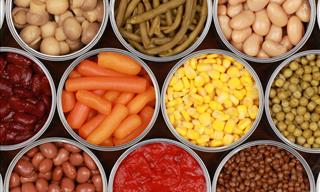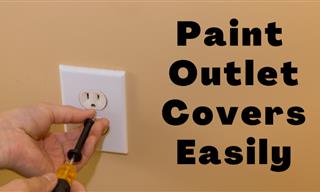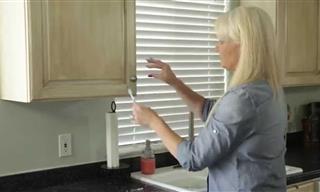





We just posted a very informative guide about removing stains from this material: Stain Removal Tricks For Stainless Steel Pans & Appliances.
Sadly, scratches are inevitable, but these can be regularly buffed out with an abrasive cloth. Avoid leaving your cast iron pan on the counter to avoid rust stains. Any rust stains that do occur can be eliminated with a paste of lemon juice and baking soda.





Guide: How to Clean Your Car's Side Mirrors so They Shine
This article provides a detailed guide as to how to best clean your car's side mirrors.

How to Remove Burnt-on Food Residue From Pots and Pans
Before you reach for steel wool, try these effective and mild methods of removing persistent food residue from pots and pans.

8 Surprising Ways Vinegar Can Help With Pet Care
From being a natural flea remedy to cleaning the aquarium, vinegar proves to be an excellent option for taking care of your pets.

Clean Your Washing Machine With This Easy DIY Cleaner
This natural DIY formula will keep your washing machine safe and clean.

Laundry Tips: Make Your Towels Soft and Fluffy Again
Here are some useful tips that will help you make your crusty towels feel soft and fluffy again while also increasing their longevity.

11 Household Lifehacks You Should Never Forget
These 11 tips are complete life savers!

What Is Your Learning Style? This Chart Explains
What is your learning style? Identify your learning style with this chart.

The Easiest Way to Clean and Freshen Your Mattress
There are thousands of small reasons to clean your mattress, and one simple way to do so!

COLLECTION: Growing Tips for Outdoor and Indoor Plants
Dive into the world of indoor and outdoor plants with these 10 great guides to show you the way.

Guide: How to Use Rising Interest Rates to Your Benefit
Consider these tips to meet your investment goals when rates are rising.

How to Start a Garden on a Windowsill
No green thumb is needed for this simple gardening project.
 4:08
4:08
Lost a Key and Need to Pick a Lock? Do This!
Need to pick a lock? Here's how to do it.

20 Foods That Should Be Kept Out of the Refrigerator
The refrigerator allows us to keep food fresh for longer, but there are certain foods, such as the 20 here, which are not meant for the cold...

10 Features to Look For When Buying a New Washing Machine
If you’re buying a new washing machine, you should keep these tips in mind first.

The 7 Biggest Mistakes People Make With Their Wills
Make sure your heirs get what you want them to get by not making these mistakes.
 10:01
10:01
Insecure In a Social Situation? Here Are A Few Tricks
How to avoid being influenced by others? Or make sure somebody likes you? This video offers tricks to handling nearly any difficult social situation.

How to Grow the World's Most Expensive Spice at Home
Saffron doesn't have to be that expensive. It is a natural resource that should be available for everyone - use this guide to grow your own!

12 New Things You Can Learn For Free From YouTube
Looking to learn something new? Learn some useful new skills with YouTube.

10 Ways to Get Rid of Black Circles and that Puffy Look
Had enough of looking tired? Try our natural recipes to rid yourself of that tired look.

Keep the Bedroom Cool in the Summer Heat with These Tips!
Getting a good night's sleep during the hottest summer months doesn't have to be a challenge. With these clever easy tricks, you'll sleep like a baby!

7 Proven Techniques for Testing & Fixing Christmas Lights
Test your holiday lights with these easy fixes.

The 7 Best and 7 Worst Foods to Buy Canned
Not all canned foods are made equal, and in this article, we'll discuss those you should invest in, as well as those to definitely avoid.

Warning: Using Dryer Sheets May Cause You Health Problems
Is it really such a good idea to use dryer sheets? The answer may shock you.

Practical Tips on Adjusting a Home to be Senior-Friendly
Take note of these useful tips that will help you make your home more accessible and safe for your life ahead.

The Ultimate Guide to Using and Creating Sherry Vinegar
Not only is sherry vinegar delicious, but it also has many health benefits too. Find out more here.

Your Toothpaste Can Be More Harmful Than You Think
Stop using toothpaste that fills your body with nasty chemicals, and try making one of these natural versions instead.

6 Great Benefits of Waking Up Early
Do you promise yourself that you'll wake up early the next day, but at the moment of truth you hit the snooze button? Stop this with these 11 tips!
 2:23
2:23
These Tips Will Make Your Grocery Shopping a Breeze!
Grocery shopping alone can be a stressful task. Learn the tricks of how to do your shopping with ease, even if you have kids around.

Tea Is Much More Than a Drink. It Has MANY Other Uses!
Tea isn't just for drinking, it's one of the most helpful materials in the house!

Start Managing Your Time Right With These 5 Techniques!
Even the most organized people find themselves with little time on their hands throughout the day, but with these techniques, you can get it all done!

9 Foods that Directly Affect Our Body Odor
In this article, you can find details about six ingredients that can make your body odor unpleasant, and three more that bring out a nice scent.

17 Bad Housekeeping Habits You’re Likely Unaware Of
These 17 housekeeping habits are some of the most undesirable out there.

The BEST Plants to Display in the Living Room
An abundance of plants is an evergreen trend in interior design. See which plants are best suited for a living room setting and learn to style them.

The Best Plant Milks For Every Task
Different plant milks work best for various tasks, which can be tricky. This culinary guide will help you choose the best ones for you

This Little Kitchen Tool Can Do Wonders for Your Skin
we have compiled a list of ten exercises that can help reduce, eliminate, and prevent wrinkles on your facial skin.

Do You Have Dandruff? Here's How to Get Rid of It!
Do you suffer from dandruff? If so, instead of buying expensive shampoos, try these 8 natural remedies instead!

Bored of the Outlet Covers? Here's How to Paint Them Well
In this article, we'll learn how to paint and wallpaper plastic or metal outlet covers effectively and professionally.

15 Reasons to Never Throw Away Used Corks Again!
There's no limit with what you can do with a simple collection of corks. Make your used corks useful again with these brilliant DIY ideas.
 9:13
9:13
If Food Has Ever Stuck To Your Pan, You Need This Tip
This video gives you 4 tips that ensure no food will ever stick to any of your pans.

Book Recommendations: 10 of the Best Reads for Dog Lovers
If your best friend is a dog, then you’ll this list of the best book about dogs.

These Guides Are Chock-a-Block With Helpful Info
Take our advice – keep these useful guides at hand for they might come in use someday.

Be Warned that These Plants May Kill You
If you've got these plants around the house be careful as they are deadly!
 3:33
3:33
Quick Tip: Clean the Gunk Out of Your Kitchen Cupboards!
A quick tutorial that teaches how to clean your kitchen cupboards without damaging them.

Your Ultimate Guide to Wearing that Suit!
A beginner's guide to wearing a suit the right way.
 10:37
10:37
Senior Health Guide: Working Out With Weights
Every senior must watch this video.

The Best Natural Methods to Controlling Excess Sweat
While sweating can be good for you, sometimes it can be embarrassing and cause a foul odor. Discover natural ways to prevent excess sweating.

These YouTube Channels Are a Delight for Senior Citizens
Discover the best YouTube channels for seniors that offer a plethora of engaging and entertaining content.


